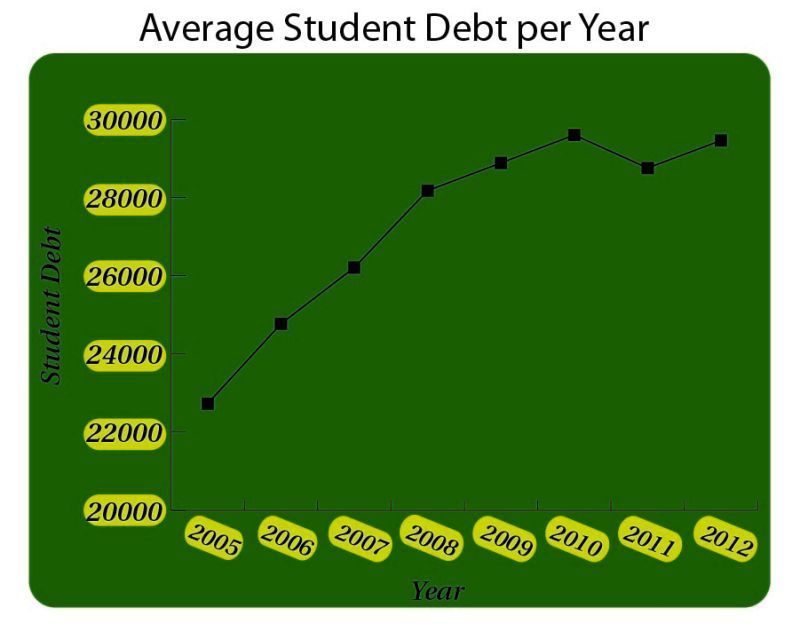ISU receives large grant to lessen students’ debt
By Robert Mercer, rob.mercer@iowastatedaily.net
Shown above is the average student debt from years 2005-2012.
March 11, 2014
Iowa State has recently received a $40,000 grant to become the 15th university research partner in the Enhancing Student Financial Education program.
This program gathers data to determine how debt affects graduate students and increases awareness about financial responsibility to undergraduates.
Daniel Denecke, associate vice president of programs and best practices at the Council of Graduate Schools, said that Iowa State can use this grant to implement the educational program, to develop its financial resources and conduct the research to contribute to the data that the program needs.
One of Iowa State’s roles in this program will be to survey its graduate students twice. The first survey, conducted in Fall 2013, asked about graduate students’ awareness of debt and their financial habits, how much debt they have and what kinds of debt they have.
“In the fall of 2013, [the program’s research partners] conducted a survey on graduate students’ attitudes and behaviors about their debt, about debt generally and about financial education,” Denecke said.
Graduate students will be given the same survey this upcoming fall, and the results will be compared to last fall’s responses to find potential changes in attitudes and awareness toward financial education.
“It might be an early indicator or sign that the projects these universities are developing and the resources are actually reaching students,” Denecke said.
Before Iowa State was approved for this grant, workshops and presentations about financial aid and filing a Free Application for Federal Student Aid were available to any student groups that requested them. Additionally, Iowa State has a financial counseling clinic that provides assistance to students about money management, debt management, first-time home buying and more.
The second survey will ask graduate students about how much debt they have and the sources of their debt. It will also ask how they are using their financial resources to support their living expenses and get a larger picture about how these students are facing their financial challenges.
In addition to working with its graduates, Iowa State will host financial literacy sessions and introduce GradSense, an interactive debt-to-salary calculator, to its current students. GradSense allows students to weigh the average student debt of the degree they seek with the average salary they hope to earn in their desired careers.
According to the American Student Assistance website, student debt nationwide is more than $1 trillion with an average debt of $29,456 per borrower in the state of Iowa. Having the burden of paying off massive debts after graduation from any college can diminish the quality of life once graduates have to start making payments.
Michael Bugeja, director of the Greenlee School of Journalism and Communication, said that the less debt a student has, the better off they will be and the longer they will be gainfully employed.
“People who graduate [with no or little debt] will be able to get jobs, remain in Iowa and have quite a lovely life in terms of their own apartment, their own cars and their own independence,” Bugeja said. “But if we take that same student and they have $30,000 or more in debt, they may not have that car, they may have to share an apartment and their professional life might not be so lovely. It might be tedious because they’ll be paying bills all the time.”
While the program would like to play a part in lowering the total amount of student debt nationwide, informing students how to responsibly borrow money for their education and teaching them money management skills are higher priority goals for this program.
“Investing in higher education is a good investment, generally,” Denecke said. “A real goal would be making sure that students are making educated decisions about how much to borrow in terms of their longer-term potential earnings and the overall picture financially.”
One of the events that Iowa State will host to engage student involvement in personal finance is the Money Game Jam. This event is a 24-hour long team competition to create a game or application that will bring financial awareness to ISU students.
Jonathan Fox, director of financial counseling, said that there is a $1,000 prize for the winning project and the possibility that the project will receive additional funding from the $40,000 grant toward further development.
“The goal is to have this competition, come up with a good idea, develop it and then hopefully next year have Iowa State students using it,” Fox said.
Money Game Jam will be held at the Hixson-Lied Student Success Center from 11 a.m. March 29 to 2 p.m. March 30 and is open to all students.







